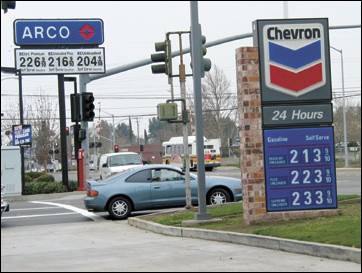Gas prices change student driving habits

Image: Gas prices change student driving habits:California’s gas prices are amongst the highest in the nation.Photo by Katie Joshson/State Hornet:
March 19, 2003
The soaring costs of gas have affected Sacramento State students’ lifestyles and taken a toll on university costs.
Junior Greg Mendoza’s Ford Bronco only gets eight miles to the gallon, so because of higher prices at the pump, more of his money goes towards gas.
“It’s ridiculous that we have to pay that much for gas,” said Mendoza. He spends five to seven dollars per day just to get to school, work and the gym.
Mendoza said the cost of gas cuts down on the amount of things he does. The cost to completely fill his 35-gallon tank is close to $80, he said.
“I never fill up, of course,” Mendoza said.
Sophomore Johnny Ngo works at the Shell station on the corner of Howe Avenue and College Town Drive. He sees the prices go up firsthand.
“The corporate office sends us a letter telling us how much the price has to go up,” Ngo said. “Pretty much we raise our prices two to three times a week.”
The price for regular unleaded was $2.13 a week ago with unleaded plus at $2.23 and supreme at $2.33.
Although he works for a gas station, he isn’t happy about the continually increasing prices.
“I barely drive now,” Ngo said. “I just go to school and go to work.”
Sophomore Greg Sheppard opts for a different way to get to school. He drives to Mather Field’s Light Rail station, which takes him to 65th Street, and from there he takes Regional Transit to campus.
“It saves me the trouble of traffic in the morning, and trying to find a parking spot,” Sheppard said. “I cut down on driving in general.”
Students aren’t the only ones affected by the higher prices. The campus police spend about 40 percent more on gas, said Lt. Dan Davis.
“We still have to drive just as much as we drove before,” Davis said.
University Transportation and Parking Services Manager Nancy Fox said their expenses are going up, but UTAPS has not seen a total and is waiting for the bills.
The rising cost of fuel has drawn Gov. Davis’ attention. Davis called for an investigation of the sharp rise in gas prices by the California Energy Commission and the California Public Utilities Commission.
“As governor, I’m deeply concerned that these unexplained price spikes may be the result of price manipulation or deliberate withholding of supply,” Davis said.
The last time gas prices skyrocketed was in the 1970s when there was rationing and long lines at the pumps.
How a person’s license plate ended, odd- or even-numbered, determined what day a person could fill their tank at a gas station, and on some days gas stations ran dry.
“To change energy prices has a ripple effect through the whole economy,” said Professor John Syer in the CSUS government department. The effects of gas prices have many ramifications, he said.
Anything to do with manufacturing, transportation and tourism will be affected, along with daily tasks, such as doing laundry, Syer said. Patrons of airlines are already seeing an increase in flight prices for tickets that were already purchased.
“(Airlines) base their original ticket price on a lower fuel charge,” Syer said. Surcharges are being added to fares to make up for the cost difference.
“There are predictions that when combat is underway (gas prices will) spike,” Syer said. “Supplies could be at risk during warfare.”
Syer said the ability to move oil tankers though the Persian Gulf will be jeopardized because it might be impossible to get them insured to travel through a war zone.
Organized Petroleum Export Countries is the alliance of the petroleum-producing countries in the world.”All (members of OPEC) agree to keep production low, so demand is high,” Syer said.
Syer said the strategy creates a cartel, or monopoly.
“We’re (America) dependent on the world for oil,” Syer said. “They’re (oil countries) using oil as a weapon.”
The U.S. dependence on oil increased from about 30 to 40 percent in the late ’70s to over 50 percent today, Syer said. Japan and European nations rely on the oil in the Middle East also.
Hybrid cars that use gas combined with battery power to run are one alternative, Syer said. Former President Carter supported hydrogen fuel celled cars in the ’70s to decrease the reliance on gas.
“A real increase in gas prices should help America realize we need to get off relying on petroleum,” Syer said. Major developments anywhere in the world impact America, Syer said.
The impact of the war on the world is unknown. Most economists believe the war will produce higher energy prices, he said.
“We’re hostage to foreign events,” Syer said. “We need stability.”
Click here to send private feedback about this article to the State Hornet’s News staff.




























































































































